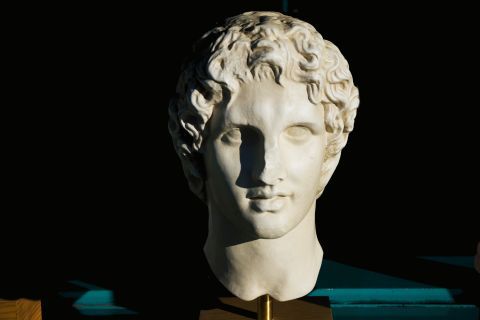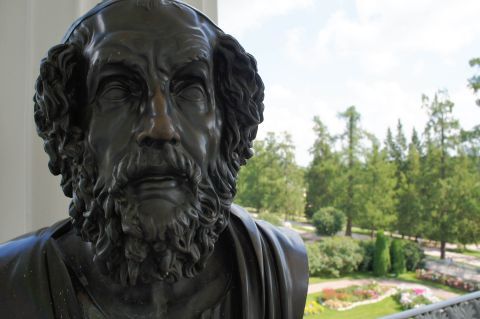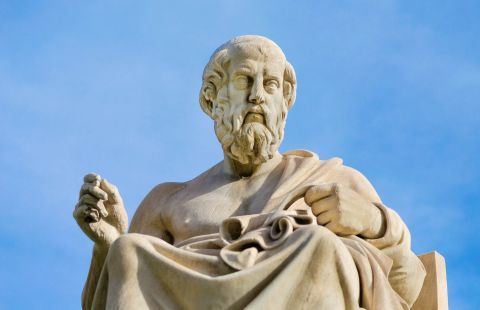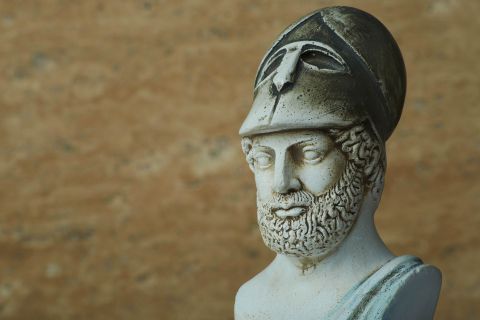Famous Greek people

Alexander the Great
Alexander the Great is the most famous Greek personality ever. His short life was full of adventures. Born in Pella, Macedonia, in 356 BC, he became king at the age of 20. After he united the Greek city-states, he launched an expedition to the East and managed to conquer the Persian Empire and extend the borders of his kingdom till India. He died a month before he turned 33, beloved as a god while he was alive and celebrated as a legend after his death.

Homer, the Epic Poet
Homer, the famous poet of the Greek antiquity, is known all over the world for his two epic poems, the Iliad and the Odyssey. Historians believe that Homer was blind, as shown by his name, which in Greek means "he who can't see". Many cities claim to be the birthplace of Homer, while it is believed that he died in Ios, the homeland of his mother. He lived in the 8th century BC and didn't actually write his poems, but narrated them and scholars wrote them down.

Socrates, the Enigmatic Philosopher
Socrates is considered today as the founder of Western philosophy. His notions of ethics, virtue and truth passed through centuries. Although we have no manuscipts of Socrates himself, his life and ideology are vividly presented in the works of Plato and Xenophon, his direct students, while some accounts are also found in Aristotle and Aristophanes. Socrates believed that the real truth is hidden in every man and all he has to do is to discover it. Because of his philosophical teachings, he was accused of corrupting the youth and was sentenced to death by the Athenian politicians. He died in prison drinking poison.

Plato, the Metaphysic Philosopher
Plato (428-358 BC) is one of the three most famous Athenian philosophers. Student of Socrates and teacher of Aristotle, Plato is the most vague of the classical thinkers. His theories were much innovative for his time. Plato introduced a new political system, where philosophers, as the holders of real truth and knowledge, would rule. An opponent of democracy, Plato thinks that ruling a state must not be based on persuasion but on wisdom. Giving his theories a metaphysical aspect, Plato believed that two parallel worlds exist, the real world and the world we live in, which is a reflection of the real world.

Aristotle, the Philosopher of Reason
Aristotle, student of Socrates and Plato, is the third most famous philosopher of the Greek antiquity. He studied in the Academy of Plato, the first university of the world. When Plato died, he went to teach the son of king Phillip of Macedon, Alexander the Great. On his return to Athens, he founded Lyceum, a school of philosophy and other sciences. Although only one third of his work survives today, it can be seen that he studied almost all sciences known in the ancient times. His philosophical notions survived for centuries and influenced a lot the Western culture.

Pericles, the Inspired Statesman
Pericles (495-429 BC) was the man who led Athens to its glory. An inspired politician, a brave general and a persuasive orator, Pericles led his hometown to the top scale. It was under his guidance that Athens became the greatest naval power all over Greece, that the Acropolis was built and that culture was developed. Born in 495 BC, he took part in many battles and remained leader of the town for 40 years. After his death, Athens lost his power and never managed to recover from this loss.

Leonidas, the legendary King of Sparta
Leonidas, the legendary king of Sparta, is world famous for his act of self-sacrifice, when he and his 300 Spartan soldiers died in the battle of Thermopylae to protect the rest of Greece from the Persian invasion, in 480 BC. Today, the statue of Leonidas lies at the site of Thermopylae to commemorate this special event. The tomb of the king is found in Sparta, his homeland, where he was honored as a god till the Roman times.

Solon, the Athenian Lawmaker
Solon (638-558 BC) was an Athenian politician, lawmaker and poet. He came into power in a time when the society of Athens was facing serious social problems and his reforms were crucial for the creation of a new governmental system that would make the fate of the town, democracy. He actually gave political rights to common citizens, not only the noblemen, and enforced trade as the main economic source of the town. Although his political measures lasted for short, Solon had already set the ground for the development of the town which came with Pericles about half a century later.

Hippocrates, the Physician
Hippocrates (460-377 BC) is the most famous physician of ancient Greece. Developing very innovative theories and practices for his time, he combined medical observation and philosophy to cure illnesses. Hippocrates believed that the human body has the power to heal itself. He said that all is a matter of balance between the four elements of the body: blood, black bile, yellow bile and phlegm. People get ill in case this balance is interrupted. To restore this balance, he didn't use drugs, except for natural extracts and soothing balms.

Archimedes, the Mathematecian
Archimedes (287-212 BC) is famous as the greatest mathematecian, engineer, inventor and astronomer of the ancient world, a Leonardo da Vinci of his times. He was born in the Greek colony of Syracuse in modern Italy. We don't know much about his life and he probably wasn't that famous in his era. However, when his manuscripts were found and translated in the Medieval times, he attracted the attention of many scientists. His most famous theory is the Principle of Archimedes, the centre of hydrostatics, according to which when an object is immersed in liquid, the amount of liquid displaced is equal to the volume of that object. Archimedes is also famous for measuring the circle.

El Greco, the painter
His real name was Domenicos Theotokopoulos, however he became famous as "El Greco" (The Greek). When he was born, Crete was under Venetian Occupation. At the age of 26, he moved to Italy, opened a workshop and spent several years there. In 1577, he moved to Toledo Spain, where he stayed till his death. Regarded as a precursor of Expressionism and Cubism by modern critics, the paintings of El Greco were mostly inspired by religion. He also made many famous portraits. El Greco died in 1614 and was buried in the Church of Santo Domingo El Antigua, in Toledo.

Nikos Kazantzakis
Nikos Kazantzakis (1883-1957) is the most translated Greek novelist of the 20th century. Born in Heraklion Crete, Kazantzakis studied law in Athens and philosophy in Paris. His work as correspondent gave him the chance to travel in most countries of the world. His book The Last Temptation of Christ (1950), where Kazantzakis shares his metaphysical and existential concerns, was prohibited by the Roman Catholic Church. When he died, the Orthodox Church didn't allow him to be buried in a cemetery, which is why his tomb lies outside the walls of Heraklion. Following his will, his epitaph reads I hope for nothing. I fear nothing. I am free.

Constantine Cavafy, the Poet
Constantine Cavafy (1863-1933) is one of the most famous Greek poets worldwide. Born in Alexandria Egypt to Greek parents, he managed to distinguish with his sensitive and liberal style of writing. His poems are inspired by philosophy, mythology and history, while he frequently expresses personal experience in his works. His work was often a base to express his homosexuality, which was a taboo for his time. Irony is a common feeling in his poems, while he didn't keep the structural forms of his time, such as rhyme. The best known poem of Cavafy is Ithaca, a philosophical poem based on the journey back home of Ulysses.

Aristotle Onassis
Aristotle Onassis (1906-1975) is probably the most famous Greek businessman and he was considered one of the richest man in the world, when he was alive. Born in Smyrna, now Izmir Turkey, to Greek parents, he left to Argentina and managed to make a vast fortune out of tobacco trade at first and then of shipping. Although his methods were not always legal, he managed to exploit his persuasive nature, acquaintances and good luck to get rich. Onassis married twice, to Athina Livanos and to Jacqueline Kennedy. He also had a long-term affair to opera diva Maria Callas.

Maria Callas
She is mostly called La Divina and she has been awarded as the greatest opera singer in the world. Maria Callas was born in 1923 in New York to Greek parents. In 1937, her family moved to Athens and she attended music courses in the Conservatory of Athens. Soon, her teachers appreciated her warm and heavy voice. After some performances in the Greek National Opera, she moved to Italy and started to perform in La Scala di Milan. Her career reached its peak in the 1950s and then it decreased, either from a vocal decline or because she wanted to focus on her personal life, which was marked by an unlucky marriage, a devastating affair to Greek ship owner Aristotle Onassis and loneliness.


